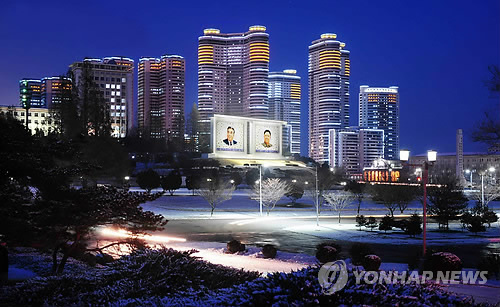- California Assembly OKs highest minimum wage in nation
- S. Korea unveils first graphic cigarette warnings
- US joins with South Korea, Japan in bid to deter North Korea
- LPGA golfer Chun In-gee finally back in action
- S. Korea won’t be top seed in final World Cup qualification round
- US men’s soccer misses 2nd straight Olympics
- US back on track in qualifying with 4-0 win over Guatemala
- High-intensity workout injuries spawn cottage industry
- CDC expands range of Zika mosquitoes into parts of Northeast
- Who knew? ‘The Walking Dead’ is helping families connect
US updates travel warning for N. Korea regarding arrests and detention

This photo released by Rodong Sinmun on Dec. 31, 2014, shows the snow-covered downtown of Pyongyang, the capital of North Korea. (Yonhap)
WASHINGTON (Yonhap) — The United States has updated its warning against traveling to North Korea, saying American citizens could face arrest and lengthy detention due to Pyongyang’s inconsistent application of its criminal law.
U.S. citizens have often been detained in North Korea on charges of anti-state and other unspecified crimes. Widespread views are that the communist nation has used the detentions as bargaining chips in its negotiations with Washington.
It has often taken high-profile U.S. visits to Pyongyang to get detained citizens released. In November, Director of National Intelligence James Clapper made an unannounced trip to the country to win the release of two detainees: Kenneth Bae and Matthew Todd Miller.
Bae, who was sentenced to 15 years of hard labor, was freed after two years of detention.
“The Department of State has received reports of DPRK authorities detaining U.S. citizens without charges and not allowing them to depart the country. North Korea has even detained several U.S. citizens who were part of organized tours,” the department said in the travel warning updated last week.
DPRK is the acronym for the North’s official name.
“Do not assume that joining a group tour or using a tour guide will prevent North Korean authorities from detaining you or arresting you. Efforts by private tour operators to prevent or resolve past detentions of U.S. citizens in the DPRK have not succeeded in gaining their release,” it said.
Foreign visitors could be arrested, detained or expelled for activities that would not be considered criminal outside North Korea, including involvement in unsanctioned religious or political activities, unauthorized travel and unauthorized interaction with the local population, it said.
“Since the United States does not maintain diplomatic or consular relations with the DPRK, the U.S. government has no means to provide normal consular services to U.S. citizens in North Korea,” the State Department said, adding that the Embassy of Sweden provides limited consular services to U.S. citizens.















